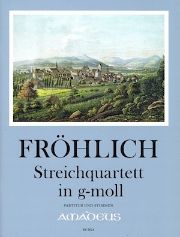Passionately urgent impulse
The four string quartets by Friedrich Theodor Fröhlich are published by Amadeus-Verlag. The G minor quartet is based on Bach, Beethoven and Mendelssohn and is also very independent.

In Aarau, close to his home town of Brugg, he felt buried alive musically, having breathed the much more cosmopolitan, culturally rich air of distant Berlin for several years. Admittedly not only to his advantage, as Friedrich Theodor Fröhlich (1803-1836) was a highly intelligent, richly talented and well-read, but brooding, at times argumentative and above all overly sensitive young man. Although he met greats of his time such as Felix Mendelssohn in Berlin and even studied under his teacher Carl Friedrich Zelter, he remained a condescendingly mildly ridiculed outsider figure who turned every rejection and ignorance of his work and his person into bitter frustration, which consumed him throughout his life and ultimately drove him to suicide. His emotional excitability, his spirit hungry for beauty, formed the great thematic reservoir for a successful, expressive artistic development. However, a more stable basic constitution and more external support would have been needed to provide the necessary discipline and economic framework. Thus Fröhlich was a great talent, according to current knowledge even the most important of the early Romantic era in Switzerland, who failed far too early because of himself and his environment.
Despite his relatively short creative period, the full exploration of his oeuvre is still far from complete. It is thanks to an initiative of the International Fröhlich Society and the Amadeus publishing house in Winterthur that, among other things, the series of four string quartets he left behind, which are among his most ambitious and best creations, has been completed. Obeying the passionate, urgent impulse of his time, they exhibit a degree of originality that makes the absence of later works all the more painful. All the more so as Fröhlich's end came at a time when Beethoven's dominant contribution to the genre led to a paralysis of the string quartet, which only Robert Schumann was able to break through after Mendelssohn. First and foremost, Fröhlich's wonderful, glowing, sung themes, especially in the slow movements, should be mentioned, but also his formal experimentation, the risk of harmonically surprising twists and turns, the always captivating conversation between the instruments. It may be that he sometimes overstretches his music in terms of content, wants too much and thus loses intellectual coherence. But his original musicianship has long since made up for these shortcomings with audience-pleasing drama and narrative density, which can always be sure of the applause and attention of his listeners.
The G minor string quartet (three of the four quartets are in minor, by the way), published by Amadeus as always at the highest level, should help to give this Swiss composer, who is still considered an insider's tip, more recognition. Fröhlich's icons Bach, Beethoven and Mendelssohn are omnipresent here, blending under his creativity into the ultimately dominant genius of an original and not in the least epigonal master.
It begins unusually with a poignant, hymn-like theme with four wonderfully ornamented variations in the Andante, which show off all the instruments to their best advantage. The second movement is a rapid scherzo in the Beethovenian manner which, despite all the accentuations, manages to sound as cheerful as a waltz. The Largo cantabile devotes itself entirely to the intimate main theme and its modulation; the Allegro molto finally begins darkly and mysteriously and could have made for a brilliant finale in terms of thematic material. Fröhlich repeatedly dwells on somewhat short-winded dialogs, which slow down the emerging drive and prevent the great sweeping pull. Nevertheless, the music is absolutely worth listening to.
Friedrich Theodor Fröhlich: String Quartet in G minor, edited by Gerhard Müller, score and parts BP 2824, Fr. 62.00, Amadeus-Verlag, Winterthur 2018








